- 2010–2019: The Overheated Decade
- Renewed Vision in 2020
- Resilient Virginia’s 2020 Priorities
- New Surveys Show Increased Understanding of Climate Crisis
- Progress on Governor’s Executive Orders
- State Legislature Takes on Clean Energy and Climate Resiliency
- Food Production Challenges and Solutions
- Resilient Events Calendar
- Membership — It’s Our Future – Sign Up Today!
What’s New
2010–2019: The Overheated Decade
According to independent analyses by NASA and the National Oceanic and Atmospheric Administration (NOAA), released in a January 15, 2020 press conference, the last decade was the hottest on record. In addition, 2019 was the second-hottest year on record, only after 2016, which continued the long-term warming trend and made the last five years the hottest on record. Additionally, 19 of the hottest years have been in the last two decades.
“The decade that just ended is clearly the warmest decade on record,” said NASA’s Goddard Institute for Space Studies (GISS) Director Gavin Schmidt. “Every decade since the 1960s clearly has been warmer than the one before.”
Since the 1880s, the average global surface temperature has risen and the average temperature is now more than 2 degrees Fahrenheit (a bit more than 1 degree Celsius) above that of the late 19th century. For reference, the last Ice Age was about 10 degrees Fahrenheit colder than pre-industrial temperatures.
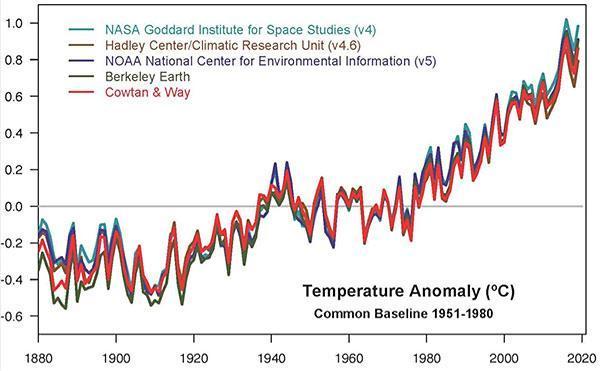 This plot shows yearly temperature anomalies from 1880 to 2019, with respect to the 1951–1980 mean, as recorded by NASA, NOAA, and additional sources. All show rapid warming in the past few decades, and all show the past decade has been the warmest. Credits: NASA GISS/Gavin Schmidt
This plot shows yearly temperature anomalies from 1880 to 2019, with respect to the 1951–1980 mean, as recorded by NASA, NOAA, and additional sources. All show rapid warming in the past few decades, and all show the past decade has been the warmest. Credits: NASA GISS/Gavin Schmidt
Using climate models and statistical analysis of global temperature data, scientists have concluded that this increase mostly has been driven by increased emissions into the atmosphere of carbon dioxide and other greenhouse gases produced by human activities.
“We crossed over into more than 2 degrees Fahrenheit warming territory in 2015 and we are unlikely to go back. This shows that what’s happening is persistent, not a fluke due to some weather phenomenon: we know that the long-term trends are being driven by the increasing levels of greenhouse gases in the atmosphere,” Schmidt said.
Weather dynamics often affect regional temperatures, so not every region on Earth experienced similar amounts of warming. NOAA found the 2019 annual mean temperature for the contiguous 48 United States was the 34th warmest on record, giving it a “warmer than average” classification. The Arctic region has warmed slightly more than three times faster than the rest of the world since 1970.
Rising temperatures in the atmosphere and ocean are contributing to the continued ice mass loss from Greenland and Antarctica, which will contribute to sea level rise, and to increases in some extreme events, such as heat waves, wildfires, intense precipitation.
Read the full press release here and view the slides from the press conference here.
In order to reverse these trends, rapid decarbonization will be required. How much and how soon is illustrated in this graphic.
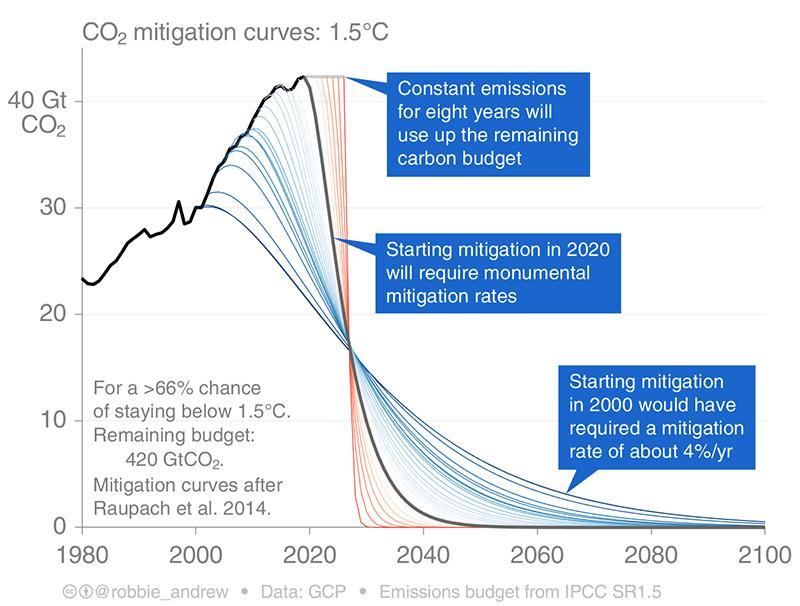 Source: Robbie Andrew, CICERO Center for International Climate Research.
Source: Robbie Andrew, CICERO Center for International Climate Research.

Renewed Vision in 2020
By Annette Osso, Managing Director, Resilient Virginia
It’s increasingly important to keep focused on a way forward that allows us to take care of the environment that is the basis for our individual health and well-being, and for prosperity of communities of people, as well as other life on the planet. Resilient Virginia recommits in 2020 to its mission of accelerating resiliency planning in communities across Virginia. We recognize that changing climate, social, and economic conditions mean that old paradigms will not work, and that assessing increasing risks and forging adaptation strategies are critical to guide communities toward a vital future. We recognize that community well-being is not only tied to continued or renewed economic activity, but also the ability of all members of the community to have equitable access to education, to health, and to opportunity.
Resilient Virginia’s priorities for the next year follow below, as well as articles that we hope direct our readers toward a Renewed Vision in 2020. We ask that you consider supporting Resilient Virginia in the coming year as we recommit to supporting communities around the state.
Resilient Virginia’s 2020 Priorities
For the next year, Resilient Virginia is establishing a series of educational workshops, under the Resiliency Academy title, that focus on the resiliency planning process for local governments and communities, on building and infrastructure resiliency, and the role of ecosystem services in addressing greenhouse gas emissions. Look for announcements of our Resiliency Academy workshop series schedule, which will take place around the state, and for our jointly sponsored events with partner organizations such as the US Green Building Council-Virginia and Leaders in Energy.
Note: You can support the Resiliency Academy series development by becoming sponsor. View the sponsor information here or contact Annette Osso, Resilient Virginia Managing Director at osso@resilientvirginia.org.

New Surveys Show Increased Understanding of Climate Crisis
Recent surveys indicate that nearly six in ten (58%) Americans are either “Alarmed” or “Concerned” about global warming, and that over the last five years the proportion of “Alarmed” nearly tripled. In addition, six in ten registered voters would support a President declaring a national emergency to act on global warming.
These findings are from the joint reports by the George Mason University Center for Climate Change Communication and the Yale Program on Climate Change Communication.
A survey report published in November 2019, Climate Change in the American Mind, is an update of the ongoing analysis of the “Six Americas” categorization of Americans, based on their climate change beliefs, attitudes and behaviors. The study indicates a dramatic shift toward percentages of the population most worried about global warming and most supportive of strong action to address carbon pollution reductions. This group now outnumbers people at the other end of the spectrum, the “Dismissives,” by three to one.
The report goes on to provide additional survey results, including whether people have perceived that they have been harmed by global warming and if they think that global warming made extreme weather events worse.
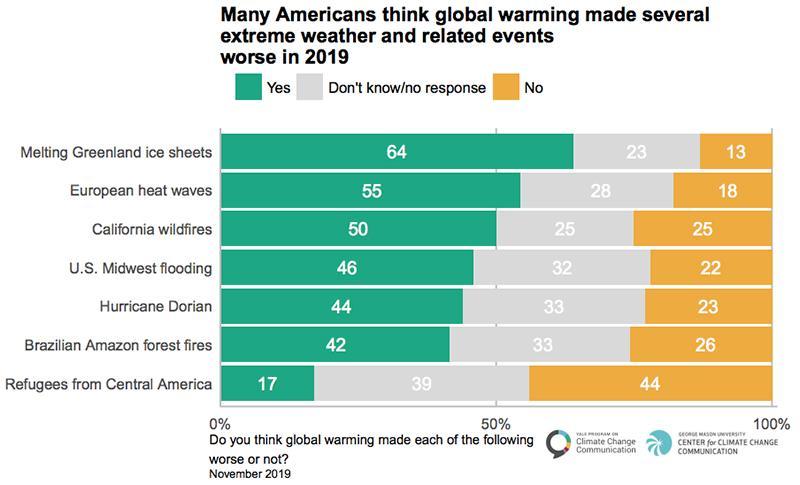 Source: Climate Change in the American Mind, November 2019, Yale University and George Mason University. New Haven, CT: Yale Program on Climate Change Communication.
Source: Climate Change in the American Mind, November 2019, Yale University and George Mason University. New Haven, CT: Yale Program on Climate Change Communication.
A January 2020 survey report, Politics & Global Warming, shows that more than four in ten registered voters (45%) say a candidate’s position on global warming will be very important when they decide who they will vote for in the 2020 presidential election. While global warming is in the top 10 concerns for Democrats, this is not the case for Republicans.
Additional survey results indicate that majorities of registered voters support polices to reduce carbon pollution, such as a Revenue-Neutral Carbon Tax or a Fee and Dividend initiative. Also large majorities of registered voters support providing tax rebates for energy-efficient vehicle or solar panel purchases and funding more research into renewable energy sources.
Finally, more than half of registered voters would support a presidential declaration of a climate national emergency. These results include a majority of Democrats (85%) and Independents (57%) and about one-third of Republicans (35%).
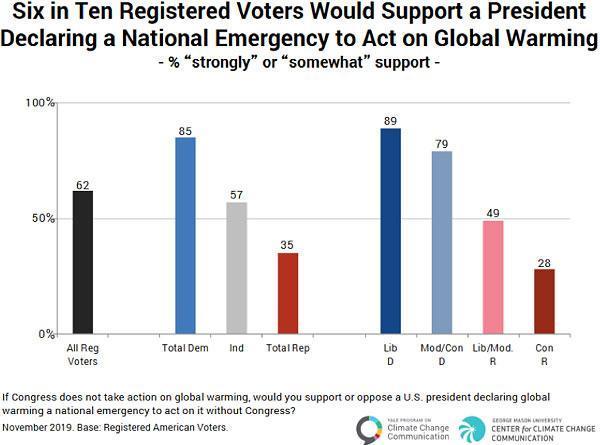 Source: Politics & Global Warming, November 2019. Yale University and George Mason University. New Haven, CT: Yale Program on Climate Change Communication.
Source: Politics & Global Warming, November 2019. Yale University and George Mason University. New Haven, CT: Yale Program on Climate Change Communication.

Progress on Governor Northam’s Climate Related Executive Orders
By Tracy Garland, Director, Social Media and Events, Resilient Virginia
Activity at the state level to mitigate the effects of climate change is heating up. At the November 2019 Virginia Coastal Policy Center’s Conference, updates on the state’s progress was conveyed by the Governor’s resiliency team.
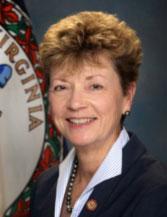 In 2018, Virginia Governor Ralph Northam signed Executive Order 24, “Increasing Virginia’s Resilience to Sea Level Rise and Natural Hazards.” Rear Admiral (Ret.) Ann Phillips, Special Assistant to the Governor for Coastal Adaptation and Protection, reported that the Governor’s office has been focused on implementing that order by setting statewide standards to reduce the vulnerability of state owned buildings; developing a coastal resilience master plan; and focusing on communication, coordination, and collaboration across state, federal, and local stakeholders. She announced that phase one of the master plan is scheduled for completion in the spring of 2020 and noted that four key priorities emerged in the planning process:
In 2018, Virginia Governor Ralph Northam signed Executive Order 24, “Increasing Virginia’s Resilience to Sea Level Rise and Natural Hazards.” Rear Admiral (Ret.) Ann Phillips, Special Assistant to the Governor for Coastal Adaptation and Protection, reported that the Governor’s office has been focused on implementing that order by setting statewide standards to reduce the vulnerability of state owned buildings; developing a coastal resilience master plan; and focusing on communication, coordination, and collaboration across state, federal, and local stakeholders. She announced that phase one of the master plan is scheduled for completion in the spring of 2020 and noted that four key priorities emerged in the planning process:
- the use of natural and nature-based features as a first line of defense;
- collaborative efforts across regions, localities and communities;
- environmental equity;
- and planning across federal agencies.
Rear Admiral Phillips explained that many of the coastal resilience issues being addressed now are statewide issues as well and identified the need for a statewide resilience plan, statewide predictive rainfall data, statewide predictive floodplain data, a statewide riverine and coastal gauge system, and consistent and dedicated funding to help localities address these issues. Finally, she identified four key elements that are common to states making progress in resiliency planning:
- state funding and prioritization;
- strong philanthropic support to fill in the gaps;
- business community collaboration and sponsorship; and
- a strong, centralized, state funded, and collaborative process that is authorized from the top down.
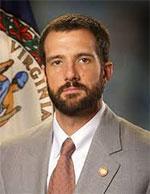 Additional comments by Virginia Secretary of Natural Resources Matthew J. Strickler further detailed a number of other critical steps directed by Executive Order 24 that have now been completed. These include developing a unified sea level rise standard projection and free board standard for state-owned buildings, and a review of Virginia’s compliance with flood protection and dam safety laws.
Additional comments by Virginia Secretary of Natural Resources Matthew J. Strickler further detailed a number of other critical steps directed by Executive Order 24 that have now been completed. These include developing a unified sea level rise standard projection and free board standard for state-owned buildings, and a review of Virginia’s compliance with flood protection and dam safety laws.
As a result of recommendations from that process, Governor Northam has signed Executive Order 45, creating the Virginia Flood Risk Management Standard. The standard is the first of its kind in the country and will ensure that state building projects are cited more thoughtfully and designed to handle current and projected future flooding events. In addition to the standard for new buildings, EO 45 requires the creation of a cabinet level working group to develop similar standards for other state-supported developments like transportation infrastructure. The standards also ensure that Virginia is in compliance with the National Flood Insurance Program and eligible for federal flood insurance and hazard mitigation grants. He announced that Virginia now has the strongest flooding elevation standard in the country, which will protect both assets and taxpayers by reducing damage from sea level rise, storm surge, and more intense precipitation events.
You can review these comments and slides from the complete agenda of the Virginia Coastal Policy Center’s 2019 Conference: The Three Ps of Resilience: Planning, Partnerships, and Paying for It All. Click here for links to the videos and slideshow presentations.

State Legislature Takes on Clean Energy and Climate Resiliency
This year many Virginia General Assembly members are taking up the challenge of moving rapidly away from fossil fuels to reduce greenhouse gas emissions. Additional bills address guidelines for state and local governments to be aware of the impacts of climate change, supporting economic transitions to a clean energy economy, supporting farmers and local rural economies, and natural resource protection. All these aspects of resiliency are evident in some of the 100’s of related pieces of legislation moving through General Assembly committees at this time. A sampling of the legislation being considered include:
Virginia Clean Economy Act (HB 1526) — Senator Jennifer McClellan, Delegate Rip Sullivan, Delegate Jennifer Carroll Foy and a broad and diverse coalition of advocacy groups and business voices unveiled the Virginia Clean Economy Act. The VCEA is expected to set a goal of a 100% carbon-free electricity supply by 2050 for the Commonwealth (through all of the state’s electric utilities). This 30-year goal would be achieved by jointly increasing Virginia’s energy efficiency levels and cleaning up its energy supply sources. It also ensures joining RGGI, a mandatory RPS (Renewable Portfolio Standard), and adds requirements for more effective energy efficiency programs by utilities.
Virginia’s Green New Deal Act (HB 77) — Delegate Sam Rasoul introduced the Green New Deal Act; Fossil Fuel Projects Moratorium, Clean Energy Mandates, Civil Penalties bill (or Virginia’s Green New Deal Act). The VA-GND would require that at least 80% of the electricity sold in calendar years 2028 through 2035 be generated from clean energy resources. In calendar year 2036 and every calendar year thereafter, 100% of the electricity sold is required to be generated from clean energy resources. The measure also requires the DMME to adopt a Climate Action Plan that addresses all aspects of climate change, including mitigation, adaptation, and resiliency. Additional aspects include job training especially for workers transitioning from fossil fuel jobs.
State, Regional, and Local Planning; Climate Change (HB672) — Introduced by Delegate Rodney Willett and others. This bill establishes a policy of the Commonwealth to prevent and to minimize actions that contribute to the detrimental effects of anthropogenic climate change in the Commonwealth. The bill requires any state agency to examine any new regulation or policy involving state action or funds in relation to its impact on climate change and its effects thereof prior to adopting or implementing such regulation or policy. The bill requires local and regional planning commissions to consider the impacts from and causes of climate change in adopting a comprehensive plan, regional strategic plan, or zoning ordinance.
Local Food and Farming Infrastructure Fund (HB1034) — Introduced by Delegate Sam Rasoul. Establishes the Local Food and Farming Infrastructure Fund and directs the Department of Agriculture and Consumer Services to establish a Local Food and Farming Infrastructure Grant Program for infrastructure development projects that support local food production and sustainable farming. The bill directs the Department to award grants for projects that include the establishment or maintenance of farmers markets; businesses or organizations that manage the aggregation, distribution, and marketing of food products primarily from local and regional producers; and primarily locally owned processing facilities. The Department is required to adopt project eligibility criteria that favor projects that create infrastructure in proximity to small-scale rural agricultural producers.
Resilience Hubs for Vulnerable Communities (HB 959) — Introduced by Delegate Jeffrey Bourne. This bill directs the Department of Emergency Management to establish a two-year resilience hub pilot program to assist vulnerable communities during emergency situations. The bill defines a “resilience hub” as a simple combination of solar panels and batteries that ensures continuous power to a publicly accessible building when severe weather events or other grid disruptions cause an electrical outage.

Food Production Challenges and Solutions
By Tracy Garland, Director Social Media and Events, Resilient Virginia
As the climate changes, so do the challenges facing farmers and ranchers. Agricultural producers have always had to handle weather-related risks, but climate change means that weather patterns have become more variable than ever and the attendant risks have increased. Prolonged and extreme droughts, warmer winters and longer growing seasons are causing increasing pest populations and more frequent crop failures. The challenges are further exacerbated in areas where competition for water is growing. Agricultural producers are now forced to adapt to a changing climate or potentially lose their businesses and livelihoods. The challenges are many and varied as are the solutions.
Fortunately, some of the best strategies for addressing climate change have been under development and testing, both formally and informally, by sustainable agriculture practitioners for decades. Key practices include a focus on healthy soils to help buffer against variability in precipitation; diversifying production systems to build soil health; pursuing diversified, high-value marketing to spread out risk; and adopting ecological design of systems to better adapt to the local climate and landscape.

The topic of climate resilience was a prominent part the agenda at the 27th Annual Virginia Association of Biological Farmers (VABF) Conference, held in January 2020 in Roanoke. The event took a deep dive into resiliency in agriculture, with workshops ranging from ecologically based weed management to soil fertility. Brent Wills, President of the Board of Directors of VABF, commented that “climate resiliency is a growing concern in Virginia and will be a focus for the organization into the foreseeable future.”
For more information about climate resiliency in agriculture, here are several resources:
Cultivating Climate Resilience on Farms and Ranches (US Department of Agriculture (USDA), Sustainable Agriculture Research and Education) This bulletin outlines the new challenges that changing weather patterns pose in agriculture throughout the United States, and ways to make farms more resilient.
Adaptation Resources for Agriculture: Responding to Climate Variability and Change in the Midwest and Northeast. (USDAClimate Hubs) This technical bulletin contains information and resources designed to help agricultural producers, service providers, and educators in the Midwest and Northeast regions of the United States integrate climate change considerations and action-oriented decisions into existing farm and conservation plans.

Resilience Events Calendar
Here are some highlights of events happening this Winter.
February 10: Webinar — Communicating the Climate Crisis. 3:00 PM. Information and registration available here.
February 28: 6th Annual Clean Energy Extravaganza. Co-sponsored by Leaders in Energy and Association of Energy Engineers-National Capital Chapter. University of Maryland, College Park, MD. Click here for more information.
March 5: Resilient Building Design. Jointly hosted by Resilient Virginia and USGBC-Virginia. Speakers, Steve Sunderman, Terrazia, and Alysson Blackwelder, USGBC. Roanoke, VA.
April 18: Arlington Home Show. Sponsored by Arlington County and Resilient Virginia. Stay tuned for information of our “Flood-Ready” workshop at this event. Arlington, VA.
April 22: 50th Anniversary of Earth Day. Connect with the Virginia Earth Day events or add your own event at www.earthday.org You can contact the Virginia Campaign Manager, Terra Pascarosa, at pascarosa@earthday.org

Membership
It’s Our Future — Sign Up today!
Support Resilient Virginia’s Goals
*Inform *Educate and *Activate
Virginia communities and help them build resiliency to ensure continued prosperity, national security, and climate change adaptation.
Thanks for your support!
Clark Nexsen
Members
Robert Baldwin
Jori Erdman
Josh Foster
Sena Magill
Neda Nazemi
Sobis Inc.
Thomas Jefferson PDC
Vestal Tutterow
With your support we can expand our resiliency information hub, carry out workshops and conferences, and offer communities tools they need to address climate change.
You can help by:
Becoming a Member
Signing on as an Annual Sponsor
Continue your support throughout the year by using one or both of these online shopping sites that contribute to Resilient Virginia:
 If Amazon is your online shopping choice, go to Smile.Amazon.com and designate Resilient Virginia and we will receive a donation with every purchase.
If Amazon is your online shopping choice, go to Smile.Amazon.com and designate Resilient Virginia and we will receive a donation with every purchase.
 Find lots of discounts and many participating stores for office supplies, general shopping, and special event gifts.
Find lots of discounts and many participating stores for office supplies, general shopping, and special event gifts.







